Institutional Context
Summary
Birmingham City University is a dynamic practice led, research inspired anchor institution with 30,000 students from 126 countries, contributing £392m GVA annually to regional GDP (£532m nationally).
Its mission is to be the University for Birmingham, to transform lives, and to work integrally with communities to realise potential. Over two-thirds (69%) of students are from Birmingham and the West Midlands with 54% BAME reflecting the University’s commitment to inclusivity.
BCU has an established national and international profile for its work on STEAM, an approach that uses interdisciplinary and transdisciplinary thinking, stimulating new knowledge and ideas, supporting open innovation and regional growth, and driving talent to support future employer needs.
Further information on BCU’s KEF strategy and activity is available here.
Institutional context
Birmingham City University’s roots date back more than 175 years to the creation of the Birmingham Government School of Design in 1843. This heritage is reflected in its unique educational offering and status as one of the largest providers of UK arts education. The award of the Queen's Anniversary Prize in 2019, in recognition of the outstanding work of its School of Jewellery, emphasises the continuing importance of its practice focus.
BCU comprises four faculties delivering 1,000+ courses, supported by 1,545 practice-based academics. Across the last 5 years it has invested £350m, and committed an additional £130m in updating its campus, providing cutting-edge facilities including a new Faculty of Health simulation suite, and a £5m investment in the iconic Alexander Stadium to drive post-2022 Commonwealth Games legacy. BCU’s expenditure stimulates £532m GVA contribution to UK GDP and supports 7,060 jobs nationally through direct employment, supply chain and wage consumption impacts.
The University places focus on practice-led education, academic excellence, applied research and innovation. It’s led by the needs of regional industry, committed to discovering new knowledge and delivering real benefit to culture, industry, society and the environment.
BCU’s ‘University for Birmingham’ mission reflects its civic university role, reinforced by its 2025 Strategy which places community at the core of its ambition. This place-based outlook has shaped the University’s approach to knowledge exchange across all KEF perspective areas, whilst also maintaining a global outlook.
By bringing together Arts and STEM disciplines through a focus on their Government-backed STEAM agenda, BCU enables it’s students to study and work across formal discipline boundaries, ensuring they have the attributes needed for future careers.
In October 2022, the £70m 100k sq.ft STEAMhouse collaborative innovation campus was opened – a physical embodiment of the institutional STEAM approach, building capacity for extensive knowledge exchange to facilitate innovation across student, academic, business and stakeholder communities.
With dedicated facilities including product development, maker space, business incubation, and specialist AR/VR discovery services; and through working with interdisciplinary research partnerships, STEAMhouse has bridged a regional gap in provision to drive innovative solutions to complex societal challenges, using science, digital transformation and creativity to underpin progress.
The University’s strong sense of place has ingrained a culture of PCE through research; shaped a position as an active regional thought leader and innovator playing to practice-based strengths; whilst also supporting wider engagement through public events, including lectures, exhibitions, and artistic performances.
BCU included 290 academics under REF2021, active in the creation of new leading-edge knowledge to drive skills, thinking and innovation central to growth. The University actively engages with 3,000+ businesses regionally, nationally and internationally and has extensive sector linkages driving research, collaboration and innovation around identified priority areas and economic strengths including creative and digital, health, and green technologies.
In 2021, the University secured the Investor in Innovation standard from the Institute for Innovation and Knowledge Exchange in recognition of its work with businesses and partners to drive innovation and growth - just the second university in the country to be handed the accreditation.
1 BCU's City Centre Campus
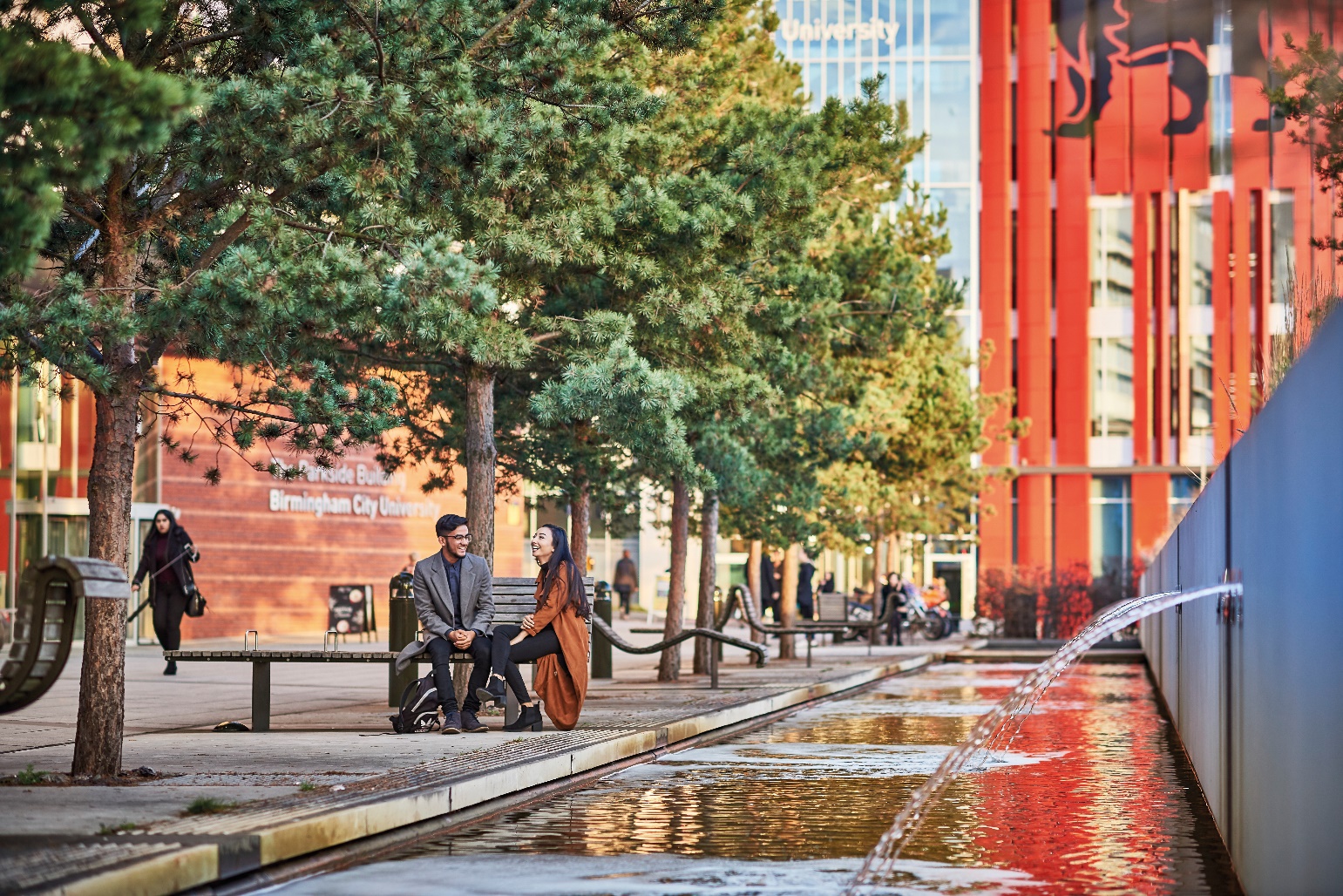
For further information, please send queries to kef@bcu.ac.uk
Local Growth and Regeneration
Summary of approach
Birmingham City University's approach to LGR is outlined in its 2025 Strategic Plan, and guided by its mission to be the ‘University for Birmingham’ through facilitating growth, innovation and productivity. The University has long-established and engrained partnerships with local and regional political, commercial and civic stakeholders to understand socio-economic needs, and to promote a position of thought leadership.
LGR activity is varied, comprising major funded programmes, capital investment, and specialist knowledge exchange, aligned to the Government’s three core Plan for Growth pillars. Activity is underpinned by effective partnerships to achieve strategic goals; reviewed to determine the extent to which it has addressed objectives; and shared through Open Access platforms.
Further information on BCU’s KEF strategy and activity is available here.
Aspect 1: Strategy
Strategy and Area
BCU’s ‘University for Birmingham’ mission, as outlined in its 2025 Strategy reflects its ongoing role as an anchor institution in Birmingham and the wider region, but also as a civic university. This contains a clear commitment to Local Growth and Regeneration (LGR): ‘We will continue to work closely with all parts of our city and region, its corporates, policy makers and its communities, to ensure that the University plays an active role in facilitating growth, innovation and productivity’.
The University’s strategic approach to LGR is embedded in the Plans of both its four faculties, and Research, Innovation, Enterprise and Employability Directorate.
In defining ‘local’, BCU predominantly works across 2 geographical boundaries defined by statute:
The West Midlands Combined Authority (WMCA); and,
The Midlands Engine (ME).
Whilst the University also has a significant national and international footprint, this statement maintains an intentional focus on the above ‘local’ approaches to LGR.
Identification of Need and Strategy Response
As a university with a strong place-based mission, BCU has long-established and engrained partnerships with local and regional political, commercial and civic stakeholders to understand socio-economic needs, and to promote a position of thought leadership.
This includes representation on key advisory boards, and shaping regional Strategies and Plans, such as the WMCA’s Strategic Economic Plan and Levelling Up Growth Prospectus; the WM Local Industrial Strategy; and the WMCA Regional Skills Plan. Another example of strategic collaboration is BCU’s work with regional leaders, policy makers and communities to drive future thinking through STEAM Sprints and STEAM Challenge events.
In addition to partnership, intelligence is also secured through a range of other channels and activities, including:
Joint research and briefings with key partners such as the Quarterly Business Report;
Faculty or School-led Industry Advisory Boards to support curriculum development, student employability and research;
Formal partnership with other regional Institutions through bodies such as Midlands Enterprise Universities, West Midlands Combined Universities, and the University Alliance to drive productivity and growth through skills, innovation and enterprise;
Senior representation on Boards and Panels, such as Birmingham City Council’s Route to Zero taskforce, and the West Midlands Innovation Board which acts as an official governance structure for the regional Innovation Programme;
Support for inclusive growth through partnership and matched funding for a Regional Economic Development Institute, which provides policy support to shape Local Industrial Strategies, and provides analysis and monitoring around key themes such as skills, productivity, and employment.
This rich tapestry of intelligence and insight has provided BCU with clarity regarding the LGR needs of the area, which may be broadly categorised under the three core pillars from the Government’s ‘Build Back Better’ Plan for Growth - infrastructure, skills, and innovation. Examples of need against each pillar and alignment with BCU’s Strategy and investment response include:
Infrastructure
Need: High quality regional infrastructure is crucial to underpinning economic growth, through boosting productivity and competitiveness. The WM has a stated regional commitment to be net zero carbon in less than two decades, with energy and a sustainable environment non-negotiable regional priorities. Further, the region’s Levelling Up Growth Prospectus outlines the ambition to drive UK-leading digital connectivity through maximising the opportunities from 5G.
Response: Strategic investment in 5G research, and high-profile collaborative events such as with the Government Minister for Media, Data, and Digital Infrastructure to demonstrate its application; and leading research such as The Centre For Future Homes and the award-winning Project 80 which supports developers and housing providers to improve building practices, and reduce carbon emissions.
Skills
Need: The WM has an employment rate of 72.6% (75.6% nationally); and a larger proportion of the working age with no qualifications (11.3%) when compared to the UK average (7.9%). In terms of higher-level skills, 33.5% of the region has NVQ4+ qualifications, compared with a UK average of 40.2%. Support for high quality education and skills is vital in sustaining productivity growth and regional competitiveness.
Response: BCU has secured £7m of regeneration/development programme income since 2019/20 (HE-BCI) supporting large-scale project-based interventions specifically targeted to address identified skills and employment challenges. This includes an extension to the Higher Level Skills Match project which tackles the gap between the future skills required by the workforce, and the skills currently held (See Aspect 2).
Innovation
Need: GVA per head in the WMCA region is set to grow to £29,939 by 2040, an average annual yearly rate of 0.95%, compared to the UK average of 1.15%. Without further intervention, the region will experience below-average growth over the next decade, with a negative impact on employment and earnings. A thriving innovation ecosystem and pipeline of innovation activity is key to underpinning a step-change in performance.
Response: Institutional STEAM Strategy which includes a £70m 100k sq.ft centre for innovation, prototyping and business development, and STEAM Incubator supporting entrepreneurs, start-ups and early-stage businesses.
1 Birmingham's Skyline

Aspect 2: Activity
LGR activity is varied, comprising major funded programmes, capital investment, and specialist knowledge exchange. All activity is underpinned by effective partnerships to achieve strategic goals, and overseen by BCU’s Deputy Vice-Chancellor for Research, Innovation, Enterprise and Employability.
Targeted knowledge exchange activity through LGR also maintains a focus on collaboration with businesses, public sector and wider civil society to meet identified strategic goals or known socio-economic development priorities (See Aspect 1). The three core pillars from the Government’s ‘Build Back Better’ Plan for Growth have again been used as a thematic framework to exemplify activity:
Infrastructure
Regeneration: BCU has supported the regeneration of the city through investing over £140m in its campuses and facilities over the last 3 HE-BCI years (2019-2022) and committing a further £130m. Activity is aligned with the 2031 Birmingham Development and Curzon Investment Plans to underpin the impact of a planned £724m programme of regional infrastructure. This is exemplified by the £1m investment to collocate the School of Acting alongside Digbeth Loc – a major new TV and film studios which will be home to BBC Midlands and large-scale productions from the likes of Peaky Blinders’ creator Steven Knight; the West Midlands National Park project as a key component of post-Covid green economic recovery; and the collaborative development of the city’s Knowledge Quarter.
Specialist Regional Facilities: The aforementioned investment also includes £3.6m to provide new future digitally enabled, industry aligned and enlarged Health and Life Sciences facilities. This will directly meet demand identified through key strategies such as the NHS Long Term Plan, NHS Digital Strategy, the Plan for Digital Health and Social Care, and the Regional Life Science Skills Strategy. In terms of volume, the investment will deliver an additional 1,886 students by academic year 2025/26 and 7,058 by 2029/30.
Community Focussed: BCU is driving a post-2022 Commonwealth Games legacy through leasing the Alexander Stadium’s East and West stands, providing a world-class home for specialist sports and exercise related courses. Reflecting the University’s civic mission, this will also ensure that the Stadium remains a focal point for community, leisure, sport and health and wellbeing. The move was revealed under the 2019-2022 KEF period, and has since been formalised with announcement of a major £5m investment.
Skills
Support for Growth: The aforementioned £6.1m Higher Level Skills Match project provides local companies with access to graduates, interns and project staff with the skills businesses need to grow. It was designed with and for businesses, supporting small and medium-sized enterprises in the GBSLEP area. The project represents a collaborative partnership between BCU, two other HEIs, and three local authorities, and is an extension to the original £3.4m project which ran from 2017 to 2019.
Driving Employability: The £500k Graduate ReTune initiative represents a three year partnership with Jobcentre Plus and another HE provider - the only formal partnership of its kind nationwide between DWP and a university. The initiative directly links to the aforementioned LGR needs under Aspect 1 by addressing local labour market challenges for resident unemployed and under-employed graduates (c.1,000 Universal Credit graduate claimants) through dedicated skills and job matching support.
Addressing Skills Gaps: BCU is working in partnership with FE and HE providers, and leading sector employers across the GBSLEP to deliver an Institute of Technology. The £10.1m GBSIoT project is developing new, industry-responsive technical education with a focus on advanced manufacturing and engineering, supporting employers to address skills gaps through access to relevant technical skills provision and local talent.
Innovation
Physical Environment: The University’s £70m STEAMhouse collaborative open innovation campus (See Aspect 1) was created with the aim of catalysing new innovation through specialist facilities such as a product development service to design, prototype, test, and launch new ideas; a dedicated incubator which provides workspace, business support, and research and development expertise; and a AR/VR Discovery service to enable businesses explore the application of augmented reality and virtual reality technology to accelerate innovation.
Collaborative Innovation: STEAM Challenge events are frequently used to bring together large numbers of stakeholders from across sectors to understand and tackle complex societal challenges such as food insecurity and the green economy. This is exemplified by a Heat Pump Challenge, which brought together academics, businesses, entrepreneurs and a government advisor to discuss how a smooth transition from fossil fuels to low carbon clean heating in residential properties could be enabled.
Skills to Innovate: BCU takes a strategic approach to meeting the identified innovation skills and development needs of businesses and stakeholders, but also of its own staff base. In 2021, the University secured the Investor in Innovation standard from the Institute for Innovation and Knowledge Exchange - just the second university in the country to be handed the accreditation. Since this point, over 50 businesses and staff members have received specialist training to underpin a more focused and effective approach to innovation, supporting increased competitiveness and an innovation culture.
Cross-cutting the three thematic areas is a dedicated B2B marketing team, which manages a comprehensive database of c.31k contacts across c.25k businesses. Outreach is targeted to specific groups based on need, such as BCU Advantage business support emails to c.1,600 subscribers, and STEAM innovation support comms to c.3,000 subscribers. In 21/22 engagement platforms facilitated over 2,000 instances of support for innovation and growth.
2 Birmingham’s Alexander Stadium – Focal Point of the 2022 Commonwealth Games

Aspect 3: Results
Outputs, Outcomes and Impact
All LGR activity undergoes some level of evaluation and review to determine the extent to which it has addressed strategic objectives, and delivered intended achievements. Assessment varies in scope and formality depending on the nature of activity, scale of intervention, and funder requirement (where applicable). At a macro level, this includes consideration of:
Outputs: Measuring the LGR benefits delivered for target beneficiaries (individuals and businesses) and areas. For example, businesses assisted, business start-ups, or changes in the performance of targeted businesses typically evidenced via monitoring and participation data.
Outcomes: Usually reflecting measures of socio-economic and environmental characteristics of areas or groups of people. Outcome data includes jobs created or supported, or influence on policy or practice.
Impacts: Typically referring to the outcome change which can be attributed to the LGR intervention, economic measures such as contribution to GVA, or cultural or social impact.
Examples of BCU’s outputs, outcomes and impact against the Plan for Growth’s thematic pillars include:
Infrastructure: BCU has played a principle role in the physical regeneration of Birmingham’s Eastside District, which is now recognised as the city’s knowledge quarter, driving place-based innovation, and forming a foundation for economic activity and prosperity. Of specific note is the University’s work in creating improved collaborative and citizen-engaged solutions in support of the West Midlands National Park. This has involved close engagement with local authorities, policy makers, and civic and community groups such as the National Trust, Environment Agency, Canal and Riverboat Trust, and Culture Central to secure the best outcomes for the region.
Skills: BCU directly supports the pipeline of technical skills in key sectors through initiatives such as the Institute of Technology, ensuring seamless progression to academic, technical or vocational pathways to higher level skills. The University’s close working with regional partners to sustain regional productivity growth through high-quality STEM-education and skills training has also made significant strides toward realising the strategic goals outlined under Aspect 1. The STEM-Up initiative, for instance, has already supported 1,701 learners to upskill through bespoke training opportunities aligned to priority sectors such as digital, construction and creative industries.
Innovation: STEAMhouse has made a tangible impact to the regional innovation ecosystem. By year end 2020/21 the facility had 700+ registered STEAM members, whilst 200+ businesses had received in-year support resulting in new start-ups, products and services launched to market and new research collaborations. Further, STEAM Challenge events (which welcome the public and businesses to collaborate on innovation opportunities) were all over subscribed, demonstrating the extent to which the asset has aligned with known regional demand. Further, in Jul-22 BCU was ranked 9th nationally in terms of the volume of its Knowledge Transfer Partnerships, and the fastest growing institution for KTP growth again demonstrating the alignment of its innovation support to identified need.
Communication and Feedback
An integral part of BCU’s approach to LGR is the communication of results, and engagement with local stakeholders to assess the extent to which each intervention has both aligned with and delivered against identified needs. This takes place through a number of mechanisms, which are exemplified below.
In respect of communication:
Open Access: BCU recognises the public benefit of unrestricted access to research outputs and operates an Open Access by Default Policy, ensuring products are accessible and available to all. These materials are held in the BCU Open Access Repository supporting rapid dissemination, and increased use of outputs by businesses, government, charities and the wider public.
Thought Leadership: Targeted knowledge exchange in support of LGR priorities is also facilitated through thought leadership and lobbying, informed through academic research and the real-world practitioner experience held by BCU’s staff base. Examples include calls for greater business support from Government to enable the transition to green manufacturing; and lobbying for the acceleration of full-fibre and digital technologies deployment in the West Midlands to drive post-COVID place-based recovery and economic growth.
In terms of feedback:
Independent Review: The results of BCU LGR activity are communicated through independent review such as the 2020 Socio-economic Impact Report which confirmed a £392m gross value added contribution to regional GDP (£532m nationally).
External Recognition: BCU regularly receives external recognition for its work through awards. Examples over this KEF period include winning an AGCAS Award for working in partnership to tackle skills gaps; a UKRI Knowledge Transfer Network award for business impact; a Higher Education Provider of the Year award in acknowledgement of the University’s continued commitment to providing regional transformation, and the Investor in Innovation Standard from the Institute of Innovation and Knowledge Exchange in recognition of the University’s work with businesses and partners to drive innovation and growth.
Perception: Regular consultation on LGR strategy and performance is held through an outsourced perception survey, which captures views from community leaders, schools and colleges, local employers, leaders from relevant professional or sector bodies, and HE representatives.
3 BCU's STEAMhouse Building – A Centre for Collaborative Open Innovation

Public & Community Engagement
Summary of approach
Birmingham City University's approach to PCE is outlined in its 2025 Strategy, and guided and celebrated by its mission to be the ‘University for Birmingham’, reflecting its role as both an anchor Institution in Birmingham and the wider West Midlands, but also as a civic university.
PCE activities are typically aligned to one or more thematic activity pillars: partnership to advance growth and innovation; championing and supporting diversity; knowledge making, sharing and exchange; and cultural and creative identity. Community groups are engaged in project shaping, review and evaluation to ensure identified needs are met; with activity shared with communities through a range of mechanisms including publications, events and exhibitions.
Further information on BCU’s KEF strategy and activity is
available here.
Aspect 1: Strategy
Strategic Approach
Birmingham City University’s 2025 Strategy is underpinned by a mission to be the ‘University for Birmingham’, reflecting its role as both an anchor institution in Birmingham and the wider West Midlands, but also as a civic university.
Public and Community Engagement (PCE) is central to this place-based approach, with aligned priorities articulated in the 2025 Strategy, including:
Improving the breadth and depth of social, community and cultural engagement;
Widening access to the University and its resources;
Having a physical presence (beyond its campuses) in at least three areas of the city which suffer from high disadvantage;
Supporting staff and students to undertake voluntary work in the community.
BCU’s commitment to PCE is also reflected in its Faculty Plans, with academic quality improved through close engagement with external stakeholders, driving world-class research, ensuring ongoing programme relevance, and enhancing the student experience through opportunities for placements, internships, volunteering and mentoring.
Priorities and Goals
BCU’s distinct approach is aligned to their aforementioned values, with emphasis placed on co-producing university-community engagement with direct benefit to people, communities, governance structures, and businesses that reside in the West Midlands; but also on maintaining a national and global view in terms of PCE activity.
A detailed Public and Community Engagement Strategy and Plan underpin BCU’s PCE priorities; provides detailed goals, leadership and governance for University staff; and makes clear the responsibilities of senior academic and professional service managers. The Strategy is framed around four thematic pillars of activity:
Partnership to advance growth and innovation;
Championing and supporting diversity;
Knowledge making, sharing and exchange; and,
Cultural and creative identity.
Identification of Need
Strategy development was led by a significant programme of public consultation in Nov-19, with ongoing consultation thereafter, enabling the University to more fully understand the needs of public and community groups; and ensuring that these groups could inform aligned strategic priorities.
BCU understands, reflects and is engrained in its environment. In terms of the University’s student body, 69% are drawn from the region. In addition to its role to transform lives through education, this also enables BCU to work integrally with its communities, not only in responding to their needs and aspirations, but also though providing resource and an impetus for change.
PCE opportunities and needs are commonly identified through routes such as professional partnerships; cultural partners; community engagement events; practitioner networks; representation on Boards or Steering Groups; engagement with industry on key issues and expertise; and through research. EDI considerations are also central to BCU’s approach – 54% of the University’s students are BME, whilst 44% are from IMD quintile 1 (the 20% most deprived neighbourhoods). This has further enabled a rich understanding of need and approaches to effective delivery.
Governance
BCU’s PCE activity is led by the University’s Deputy Vice-Chancellor (Research, Innovation, and Enterprise), overseen by a dedicated senior working group comprising academic and professional staff, with each thematic pillar led by an Associate Dean, and operationalised through the support of a Senior Development Manager for PCE. All senior leaders have an embedded understanding of the importance of PCE to BCU’s mission.
1 BCU's Inspired Festival - An Example of Public and Community Engagement
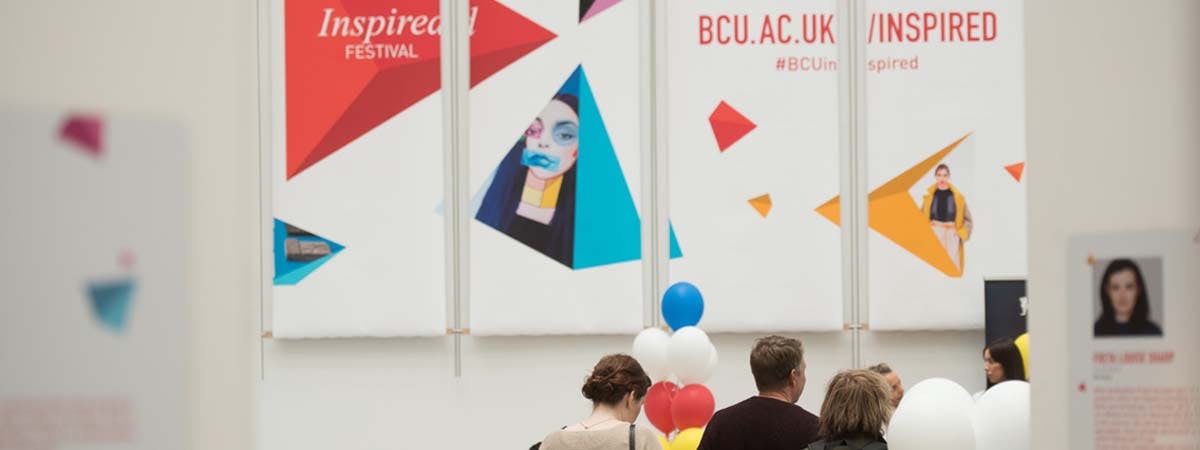
Aspect 2: Support
BCU provides a range of practical support mechanisms to deliver PCE, linked to its Strategy and Plan:
Support for PCE Delivery
Oversight: Senior academic oversight and a nominated champion for each thematic pillar, supported by clear strategic actions articulated in the PCE Plan, to underpin Institutional ambition and commitments (See governance structure under Aspect 1).
Governance and Advisory: Representatives from public and private sectors, and social, community and voluntary groups sit on various Boards and groups such as the Board of Governors, and Faculty Advisory Boards. Functions of this collaborative leadership structure include ensuring that BCU meets its objectives and charitable obligations; supporting strong community engagement; and partnership working to address specific needs or to enhance practice.
Support for Reward and Recognition
Recognition and Reward: Outstanding staff and student contributions to PCE are recognised through the dedicated Knowledge Exchange Awards, launched in 2022 to highlight and celebrate the impact of BCU knowledge exchange into the community; whilst the Graduate+ awards support and recognise extra-curricular student activity including community-based volunteering.
Support to Facilitate Engagement
Widening Participation: Through BCU hosted or supported events including public lectures, performances and galleries, or through community initiatives. This includes the £1.2m community based IntoUniversity Education Hub, opened in north Birmingham in March 2019 to increase access for young people to study at University.
Funded Programmes and Activities: Such as the Vice-Chancellor’s Strategic Investment Fund which has supported a range of PCE programmes and activities since its creation in May-18. This includes a professional mentoring scheme connecting business, public sector and civil society with opportunities to mentor BCU students.
Promotion of Opportunities: Opportunities for participation are actively publicised through a range of outlets including student-facing services such as the Student's Union; the daily staff newsletter; and intranet. Opportunities available to participants or businesses from outside the University are typically publicised through the BCU website, social media channels and the University’s dedicated business support platform, BCU Advantage.
Support for Impact
Embedded Impactful Research: Including setting up independent bodies and research centres such as the Sir Lenny Henry Centre for Media Diversity; and mapping the social issues in the city through the Birmingham 2029 agenda.
2 BCU's 2022 Knowledge Exchange Awards
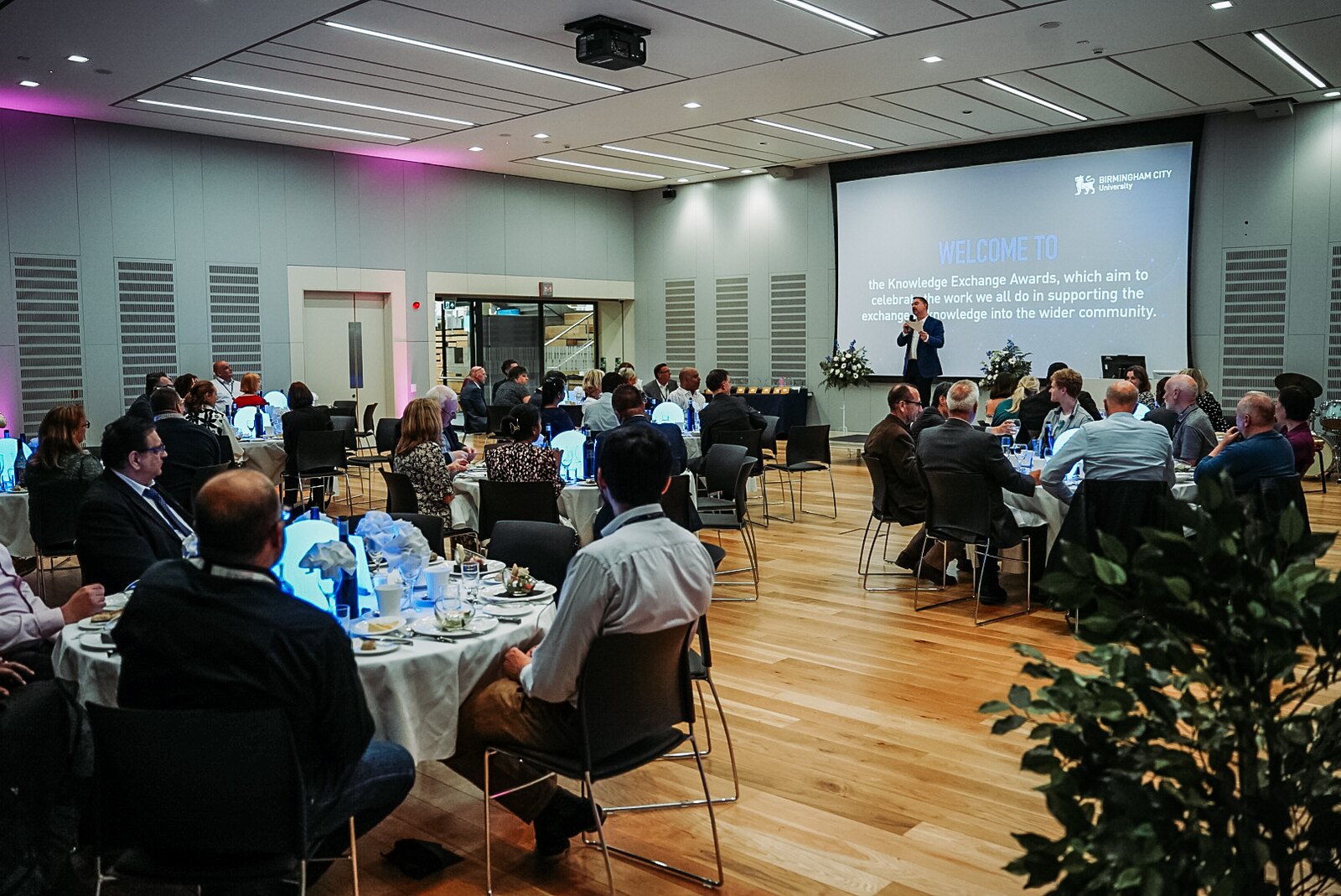
Aspect 3: Activity
Key Programmes of Activity
BCU is proud of the breadth of PCE activities that it leads upon, with an approach that mirrors its Strategy. The University’s social, community and cultural engagement activities reached an audience of 1.04m in 2021-22 (HE-BCI), of which 68% were free to access, demonstrating the Institutional priority placed on community engagement.
The following activities serve to both illustrate BCU’s approach to PCE, and exemplify the link to Strategy themes, as outlined under Aspect 1.
Theme 1 Examples: Partnership to Advance Growth and Innovation
| Initiative and Link | Framing the Focus | Overview | Volume | Practical Support/ Outcomes |
|---|---|---|---|---|
| STEAMhouse | Enterprise and Entrepreneurship/ Supporting Innovation | A publicly accessible £70m 100k sq.ft collaborative open innovation campus which aims to catalyse new innovation through physical facilities, challenge events, and skills acquisition (See LGR statement). | 2022 activity:
|
|
| Innovation Fest | Enterprise and Entrepreneurship. | Student-led digital and technological solutions to tackle business challenges, supported by partners such as Microsoft and Santander. | 2022 event:
|
|
Theme 2 Examples: Championing and Supporting Diversity
| Initiative and Link | Framing the Focus | Overview | Volume | Practical Support/ Outcomes |
|---|---|---|---|---|
| Barnardo's Early Help Mentoring Partnership | Social Innovation and Inclusion. | KT partnership with Barnardos and community interest company Our Place to recruit the local community into volunteer mentoring roles to then be matched with a child or young person with additional wellbeing needs. Supporting and championing diversity through engaging and enabling diverse communities to grow. | 2022 activity:
|
|
| BCU Forward | Capacity Building and Skills/ Enhancing Life Chances. | Provision of bespoke attainment raising workshops and academic tutoring with partner schools across a 5-year period. Supporting equality and diversity through addressing needs of each student. |
|
|
Theme 3 Examples: Knowledge Making, Sharing and Exchange
| Initiative and Link | Framing the Focus | Overview | Volume | Practical Support/ Outcomes |
|---|---|---|---|---|
| Birmingham 2029 Community Engagement Initiative | Social Innovation and Inclusion/ Supporting Place Making. | A 15-month initiative, developed and delivered in partnership with Birmingham City Council, community organisations and residents to explore aspirations, create policies and co-produce responses to support inclusive growth. |
|
|
| Early Years Career Progression Pathways | Capacity Building and Skills. | Free upskilling courses to boost employability and progression within the early years and Childcare sector through graduate level leadership and management workforce development. |
|
|
Theme 4 Examples: Cultural and Creative Identity
| Initiative and Link | Framing the Focus | Overview | Volume | Practical Support/ Outcomes |
|---|---|---|---|---|
| Birmingham 2022 Commonwealth Games | Social Innovation and Inclusion/ Capacity Building and Skills/ Supporting Place Making. | Breadth of engagement to support an impactful Games and legacy, including a broadcast training initiative with the Host Broadcast Partner (Sunset + Vine), Create Central, WMCA, and an FE provider (See LGR statement for Commonwealth Games legacy support). |
|
|
| SoundLab Brum | Social Innovation and Inclusion/ Supporting Place Making. | Provision of free at point of delivery music education hosted at the Royal Birmingham Conservatoire to young people from local communities aged 11-18. |
|
|
3 BCU's Innovation Fest
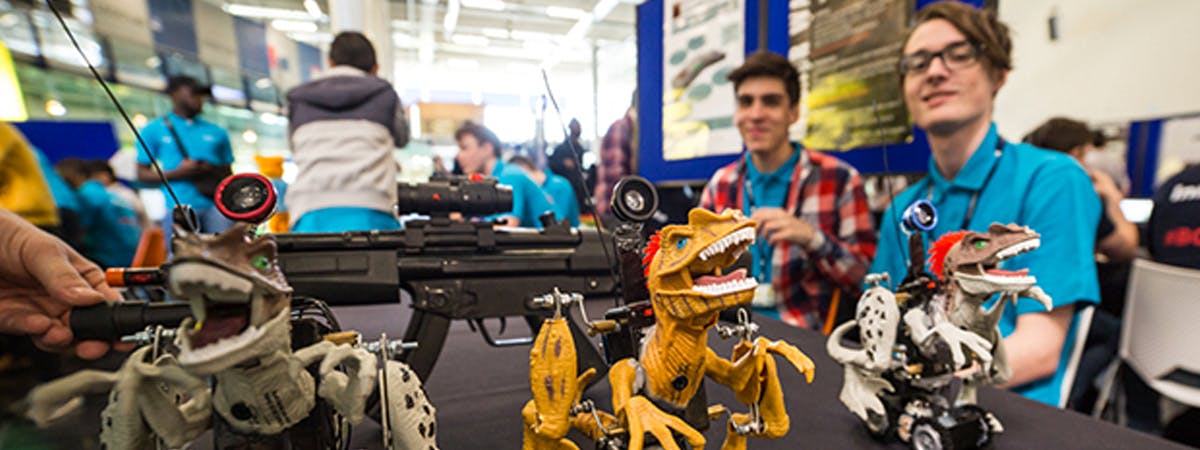
Aspect 4: Enhancing practice
Evaluation Activity
All PCE activity undertaken at BCU undergoes some level of evaluation and review to assess the extent to which it has addressed strategic objectives and delivered intended achievements. At a macro level, approaches focus on:
Outputs: Indicating the scale of activity, such as counts of community participants, website visitors, podcast downloads, publications, etc. These are often evidenced via activity monitoring and participation data.
Outcomes: Usually reflecting short-term results of PCE on individuals, systems or practice. Outcome data includes primary research with participants through surveys, interviews, feedback forms, focus groups, user feedback, and community fora.
Impacts: Typically referring to longer-term societal or behavioural change resulting from the PCE activity which often require longitudinal assessment, such as BCUs work in human rights.
BCU’s PCE Plan also includes targeted outcomes and impact against each thematic pillar, which guides activity, such as: increased staff participation, influence on policy, and enhanced community engagement.
Support to Develop Expertise
Support for staff and students to develop practical expertise takes place across three areas of focus:
Culture Change: BCU’s PCE Strategy consolidated a focus on the University’s collective capacity for PCE engagement, and approach to leveraging resources internally. This is exemplified by the creation of a new Senior Development Manager role for PCE to provide strategic leadership to stakeholder development; and stronger integration and oversight of activity across a breadth of third sector, faith groups, and community organisations.
Training: Staff are encouraged to access professional development to support their skills and knowledge of engagement. Centralised financial resource is available for targeted externally-led training through the University’s Organisational Development and Learning Manager. Internally, staff are supported via skills development and practical resources for PCE, such as through impact and engagement workshops.
Delivery: Including events such as the 2022 Learning and Teaching Futures Conference which brings staff together to learn from innovative practice taking place across faculties and professional services. The most recent conference focussed on BCU as a community and the ways in which its diversity contributes to the success of all students and staff.
Aspect 5: Building on success
Realisation of Strategic Goals
The purpose of the PCE Strategy was to create a clear roadmap for future public and community engagement up to 2025, and to drive leading edge practice in this space that can be applied both nationally and internationally. The realisation of these goals may be demonstrated through:
Consolidated Focus: At a macro level, the strategic approach has consolidated an Institutional delivery focus on, and pursuit of excellence in PCE activity. Under REF2021 23 of the University’s 34 impact case studies maintained a focus on Public Engagement, through societal or cultural impact.
External Recognition and Validation: The quality of PCE activity is also evidenced via awards, with successes under this KEF period including a Knowledge Transfer Network award for business impact; and Higher Education Provider of the Year, and Excellence in Diversity and Inclusion awards on account of the University’s approach to powering regional transformation through widening participation, and engagement within local communities.
Monitoring and Sharing
Communication of Progress: BCU has a number of mechanisms in place to communicate progress to both internal and external audiences. Internally, PCE highlights appear prominently in all communications, including quarterly all staff Vice-Chancellor briefings, staff intranet and web pages. Externally, this includes content produced by its marketing teams to promote activity, including articles on specific initiatives, and a publicly available repository of case study material.
Scrutiny of Approach: A reflective approach to PCE is undertaken at BCU, to understand both what is and isn’t working. This includes, for example, annual PCE Strategy review at Vice-Chancellor’s Office level to support continuous improvement; and monthly structured discussion and engagement with faculty Deanery to both monitor progress and shape the agenda through the External Funding Committee.
Oversight and Steering
Publics and communities are connected and engaged in the oversight and steering of the University’s PCE agenda and activity. BCU’s collaborative approach to understanding community need may be exemplified by:
Place-based Strategy and Plans: The University’s 2025 Strategy and PCE Strategy is based on a shared understanding of local challenges and underpinned by public consultation (see Aspect 1).
Design Thinking: Collaborative learning and ‘design-thinking’ through STEAM Sprints, which bring key stakeholders and communities together to create a shared understanding and ownership over the project or problem.
Challenge Events: STEAM Challenge events are also frequently used to bring together large numbers of stakeholders from across sectors to understand and tackle complex societal challenges such as food insecurity and the green economy.
Activity Shaped by Young Minds: Young people are also engaged in shaping the PCE agenda, exemplified by the Junior STEAM Academy, which encourages children to problem solve through interdisciplinary design thinking and experiment, with the programme delivered through partnership with schools across the Midlands.
4 BCU's Junior STEAM Academy
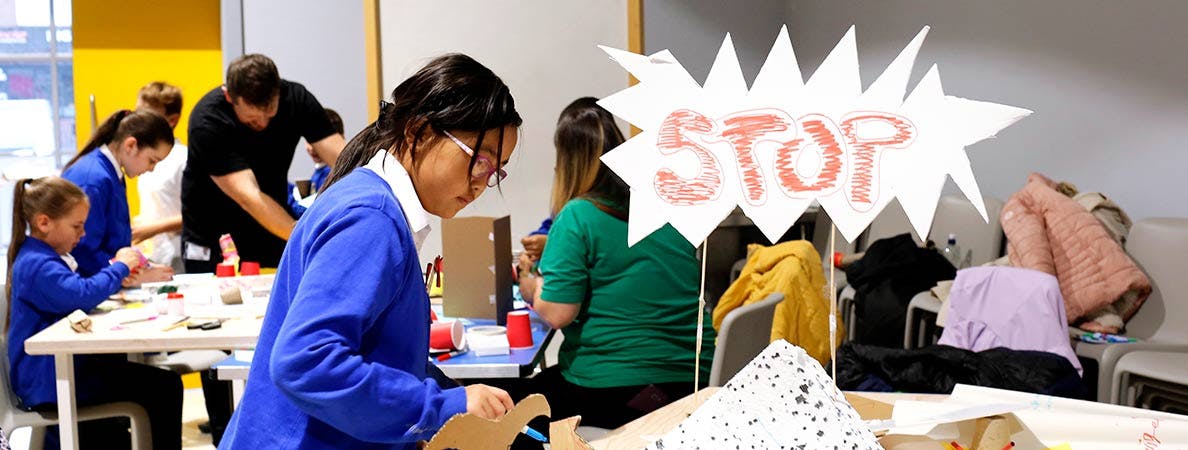
Note You are currently viewing the latest version of this narrative statement. View the previous version as published in previous iterations of the KEF (KEF1 and KEF2)